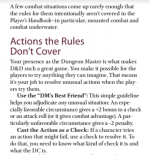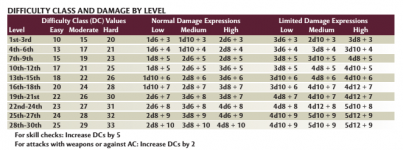To me, this reads like a description of how (some? many?) GMs find themselves adjudicating in a Mother May I fashion.
Now, it may be that there are some DM's out there who are quite witty and can make rulings on the fly without problem.
It's only been my experience, in the 3-ish decades I've played TTRPG's, that DM's tend to react less than 100% when someone produces an X factor they didn't account for out of nowhere. A player suddenly asks if he can use an ability or magic item in an unorthodox way, or wants to combine some abilities to pull off what they feel is a cool stunt, or aim a
decanter of endless water down the throat of a white dragon as it attempts to breathe a blast of super cold air- anytime you need a ruling, especially a favorable one, again, it's been my experience that the DM's first inclination isn't so say "yes, of course".
YMMV. But I know I myself, when someone produces an unexpected variable, my brain immediately asks itself a few questions.
Does this sound plausible?
Or balanced?
Do I want to set a precedent?
Do I see any problems with this down the road?
And I'm more conservative than I want to be.
A story I remember at times like this was when my friend Eric, a new DM who would come to me for advice, would complain that players always wanted to use the powers and abilities on their sheet, and never wanted to try anything creative.
I explained to him the reasons why, but he didn't seem to get what I was saying.
So I said "Hey, remember last session, when Drew wanted his Ranger to, instead of shoot two arrows into bad guys, shoot some ropes so the net over the bad guys (we were fighting on a ship, and the netting was specifically described to us) would fall on them? And you said he had to make two difficult Dex checks, and then you let the enemies make checks, and the result was the enemies were slowed, when they were in charge range of people they could attack? Seems to me that just shooting a bad guy and killing him faster would have been more effective, no?"
I'd like to say, just like a Zen koan, "and then he was enlightened". Not sure if I got the point across, but he stopped complaining at least.




